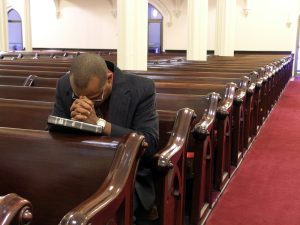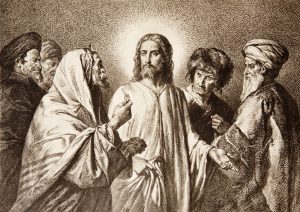The allure of the world in the fallen and temporal reality that humanity exists is an illusion or mirage in the desert. As pilgrims in this fallen world, our senses are dulled, our will distracted, and our eyes sometimes blinded towards truth and beauty. The inherited broken nature from Adam hinders our ability to sometimes distinguish right from wrong. According to St. Thomas Aquinas, the concupiscible appetite of humanity’s fallen nature is associated with initial desires of the senses. Unlike Adam prior, humanity lost perfect control of the passions after Adam’s fall. The end result is humanity’s appeal to these senses which can in some cases be good but in other cases bad. Hence illusionary goods that are immorally distasteful but physically pleasing can blind humanity. In addition, the broken human nature not only sees illusion in the near and present but also abstract and secondary goods. Greed, power, status and worship become end goals leading multiple individuals down a dark path.

The conscience always seeks good. In that our human nature is not totally devastated but the conscience while perceiving a goal as good does not always objectively choose correctly. Hence the illusion that can exist even within those with good intentions. Individuals can become so distracted by the noises of the world that they can lose sight of the truth and reality. Before Christ and His ultimate sacrifice on the cross, our broken natures were left without grace, but through the cross, Christ grants grace and guidance to His creation. This can help humanity see the noise, uncover the illusions, and focus more solely on truth. Christian Counselors, ministers, priests, clergy, and other ministry based vocations can help individuals see truth. Like Paul, we sometimes need the scales removed from our eyes to see before we can truly flourish.
The Noises of the World
St Teresa of Avila in her masterpiece “The Interior Castle” guides the soul through the world to deeper connections or castles with God. The first castles are very much consumed by the world. Outside of the castle exists the world and those who are flooded with false illusions. Once one understands the inherent malfunction of this world and understands the need of God, one is able to enter into the first castle, the entry room with God. This exist from the world of illusion into the world of reality though is nevertheless filled with noise that exists outside. The noises can pull one back and forth from truth and reality to untruth and illusion. The broken conscience and will seek the world but the intellect and mind through the grace of the Holy Spirit invite it to truth. This tug of war between the the world and God exists according to St Teresa throughout the first three mansions before the soul can become more stable. Christian Counselors primarily work with individuals in these sincere but still incomplete relationships with God. Where vice and virtue, right and wrong and truth and illusion pull at clients or spiritual children.
While the world, while marred by Original Sin, is broken, it is still beautiful. Unlike Manichean views that draw a dichotomy between the world/evil with the spiritual/good, Christian theology still sees the temporal world as still retaining goodness since it was created by God. Even our fallen human nature, still retains beauty for it is not totally corrupted. Christ became human, lived among humanity, existed within the temporal world, highlighted its beauty but also pointed out its noises and imperfections. So, while broken, nothing is totally destroyed. Not all noises of the world are evil. In Christian Counseling, it is hence important to help guide individuals through these noises, labeling them and better understanding them.
In creating a hierarch to judge the noises of the world as good, bad, or neutral, one needs two fundamental measurements. First, and foremost, do noises distract from the ultimate purpose of existence to know, love and serve God? Our primary goal in life is always spiritual. The ultimate end is always God. Things that lead to another end are noises within the world that are not good but inherently evil. Do the noises or actions from those noises correlate with God’s Law or violate it? Do they even if neutral seem to distract one from God? Secondly, some noises of the world can be more difficult to discern. Discernment involves deep spiritual prayer and reflection upon choices. What are the fruits of certain actions? Are they, as St. Ignatius Loyola point out, lead to the banner of Satan and the world, or under the banner of Christ? So noises can be difficult sometimes to discern and it is important to be able to discern what ultimately leads to God and not away from Him. So, noises within the world can be good, neutral or bad. So, we will look at some of these noises and try to better understand their role in our existence. As temporal beings, these noises although not always tied to our ultimate end are still nonetheless sometime very important. In addition, as we will see, some noises are also completely un-necessary but allow them to enter and destroy our peace.
Good Noises
As physical beings, we have physical needs and the good noises of the world meets those needs. Pieces of heaven pierce through the veil that separates and gives sunshine to the broken nature of things in temporal reality. Things that are physical but also connected to higher values such as love will exist here and in the next world. A beloved family member, friend, or even pet, is more than a temporal bond but a bond that is beautiful on earth and heaven. The noises of the world that call one to serve one’s fellow brother or sister are good noises. Seeing Christ in other human beings and being called to the temporal needs of others in this world are good noises. They do not distract but are means to the end. Unfortunately because we exist in a fallen world, happiness associated with our loved ones ultimately ends in suffering because of death and loss but these connections are re-made again with God in the eschatological reality which is perfect and true. So the noises of this world that call us to special bonds and helping our neighbor are good noises that build our union with others and God.

Some good noises are less binding to the next world and exist only in this world. They are good when in balance with our spiritual needs and understood within their proper context. Jesus who existed on earth lived as a human being and understood that existence requires not only spirituality but also physical dependence to survive. So many noises direct oneself to temporal needs because one cannot always focus on the spiritual end. These noises include the joys of a good meal, exercise, health, career and income which make survival possible. Jesus within His first thirty years of life followed in His foster father’s footsteps and worked as a carpenter. He worked, he collected income for Himself and His mother, and existed. Jesus also as a human person experienced joy with social communal meetings. He ate with friends, attended parties and weddings, and experienced the goodness that exists in this dark world.
In many ways, good noises are healthy. We have duties and obligations. We cannot always contemplate the mysteries of God but must make a living, or prepare a meal, or sweep the house, or attend a friend’s wedding, or enjoy a song or movie, or go on a vacation! Jesus understands this because He is also one of us. The good noise does not take away from God but focuses one on the daily duty ahead that is required in this important phase of our existence. What Jesus did not do though is turn these good noises into distractions to primary duty. When secondary duties consume, or events take away from God, that are not inherently bad, but in some cases good or neutral, then they can become corrupted. When one allows temporal activities to become an obsession over duty to God, then they can become detrimental. Jesus never put prayer second to anything. He also corrected Martha, when Mary focused on worship, while Martha was more concerned about preparing the house or serving the guests. Martha was not distracted by a bad thing to do, but it was her timing that Jesus corrected in regards to duty to first Himself as God, and then later temporal duties. This is why good noises must always be tied to God. One cannot focus on God every minute, but one can in the morning offer all duties and obligations to God as prayer. St Theresa the Little Flower would turn a simple action as sweeping the convent floor into an act of love by giving her daily duty to God. In this way, one can spiritualize the temporal duties and vocations one may have at home, work, or school and turn them into living prayers.
Now obviously, some urges are neutral noises. Hunger, fatigue, even sickness, can distract one from God, but again God understands when hunger or fatigue affects prayer. He understands when basic human needs push one to focus on those needs. Jesus endured all the basic human needs we do but as God was also able to teach us how to offer up those needs when suffering or upset or hungry. These minor neutral and natural distractions are noises that can distract from prayer but when offered up can become powerful tools for growth in grace. Our most beautiful prayer may be our least focused due to pain or hunger, but the effort to still say it, is most pleasing to God.
Bad Noises
Bad noises in the world are inherently evil noises of the world or neutral or initially good noises that are imbalanced or lead to distraction from the spiritual. If someone is working for his or her family with long hours or attending events with family and friends, this is good or neutral within itself, but if this causes neglect of prayer life or leads one to miss spiritual obligations then it becomes a distraction. If a sporting events prevents spiritual obligations that are due to God to become unmet, then the sporting event, while good or neutral, becomes in this particular case a bad and distracting noise. When one creates an imbalance on earthly duties or leisure events at the expense of God then God is put second and the this particular noise steals from God and distracts one from one’s duty to the ultimate end. It is important to have a hierarchy of needs within one’s life. Spiritual needs should always exist on the top of the list. When spiritual needs are neglected, these noises create spiritual sloth. This in turn creates laziness and imbalance. Imagine if one neglected teeth hygiene but over focused on skin hygiene. Hence we need to balance and meet all human needs from mind, body and soul. Obviously the soul should be at the top of the list, but when other things take away from the soul, then the soul suffers. This type of neglect or spiritual sloth occurs because of outside noises that are inherently good or neutral but distort balance and lead to spiritual sloth. One must identify what is most important and also find balance to ensure the ultimate end is not neglected.
Of course, some noises are inherently bad. Sins and vice not only distract one from God, but also call us away from God and harm the soul. They damage the soul and replace virtue and good habit with vice and bad habit. They become the illusions that present themselves as good options and look to replace God as our new idol. These bad noises pull and drag us from the first mansion of union with God and dump us again in the cold barren world. The bad noises of the world are very loud. They fall under the banner of the world and Satan and make false promises. They are cheap thrills and pleasures that ultimately lead to no long term happiness but only brokenness. Like the Sirens of ancient Greek mythology, they lure wayward sailors to impending doom.
It is important to discern the bad noises from the good noises and fight temptations that lead to the wrong path of life. These noises not only distract but lead to alienation from God and entrap the soul into the follies of the world. As Christian Counselors, we must try to help individuals escape the mire and mud of the bad noises that sometimes refuse to release. That involves identifying the true nature of these noises but also ways to help form new and better habits. As Christians, we can at any moment make a poor decision. We can not only become distracted by inherently neutral or good things but also fall victim to a bad noise. When this happens, we will feel guilt and sorrow, however, we are not perfect, nor claim it, but acknowledge our broken nature and dependence upon Christ and the grace of the Holy Spirit to seek forgiveness. So, while some may be entrapped by bad noises constantly, Christian Counselors, pastors, priests, as well as anyone in ministry should be aware that there are many who slip on the trail from time to time and need an encouraging word to get back up. Within Catholicism, confession exists, but for those within other denominations of Christianity, counseling and words of love can be very helpful. Ultimately God forgives everyone who slips. The Church is comprised of sinners. We cannot escape it, so if distracted, we must sometimes acknowledge our brokenness with humility and seek forgiveness and refocus on becoming closer to God.
Helping Christians Through Un-necessary Noises
Understanding what noises are both good and bad is an important first step but there is more sometimes in finding true balance in life. The first point is to be spiritual first. This involves the moment one wakes up, offering the entire day to God. Spiritualizing the daily duty and offering to God through Christ sets the tone for the day. Furthermore, the evening and night should end with thanksgiving.

As spiritual beings, it is important that the spiritual end with God comes first in life. Hence, even good noises, need to find placement second to spiritual obligations throughout the week. There is an abundance of opportunities throughout churches not to forgo spiritual obligation for secular event. God asks for one hour a week.
Christian Counselors can help individuals better plan times and find better management for spiritual hygiene. Clergy can help people understand the best ways to implement prayer on the go during busy schedules. One can fulfill daily temporal duties and still worship God and find time for God. This may involve also properly balancing time. Idle time on chat, social media, or tv can be moderated if in excess. When these simple neutral noises become so loud that they dominate a larger part of the day at the expense of daily duty as well as spiritual duty, then one needs to step aside and re-evaluate priorities and possible addictions. Christian Counselors, pastors, and clergy can help individuals better time manage and also balance life in regards to social distractions not in moderation.
The peace that comes with time with God can better adjust attitudes and emotions that are soiled by the constant useless idle addiction to the world. The irritations of the world cannot only make one bitter but they can also distract one from God, while focusing on useless and meaningless trivial issues on social media, or what someone is doing or not doing. Prayer refocuses and filters out the unnecessary noises. I think that is another good adjective for noise beyond good, neutral and bad. The temporal world thrusts many necessary but also many un-necessary noises on individuals that dominate their day and distract them from what is important not only spiritually but also temporarily. These distractions cause frustrations at the emotional level causing unneeded stress and bitterness for many things that do no even involve a person. The news, politics, or what someone said on a social media outlet that you will never meet can all cause unneeded anger and frustration that un-necessarily dominates the day and most negatively steals peace for oneself and prayer towards God. So, it is important to take inventory of time management on fruitless endeavors and meaningless and un-necessary noise that steals peace but also distracts one from God.
Conclusion

We are pilgrims in a fallen world. We ourselves are broken through Original Sin but through the graces obtained by Christ on the cross and administered by the Holy Spirit, we can walk through this temporal world. While broken, the world itself is not completed corrupted and through the example of Christ, we can see the importance of merely existing in it and offering everything to God. It is important however for us while existing to understand the ultimate end which is God. Through a morning offering, we can spiritualize our daily lives and instead of them becoming distractions allow them to become living prayers. Yet, we can sometimes be tugged by distractions and noises of the world and must find balance and priority with God. There are many good or neutral noises that are necessary but when they become first over God then they become big issues. Of course there are also bad noises that are inherently evil within themselves and we must try as hard as we can to limit these mistakes in life. Our goal is to live in this world, as Christ did, but to also to focus on the next. Christ is out ultimate example as both God and Man to filter through the noises of the world, discern them and offer them to God, while existing here but also hoping for there.
AIHCP offers a Christian Counseling Certification for behavioral health or human service professionals or those in ministry who wish to help counsel others to Christ. The program is online and independent study and helps equip the student with the necessary knowledge and abilities to help individuals find God. Please review the program and see if it meets your academic and professional goals.
Additional Resources
“Understanding ‘The Interior Castle’ by St. Teresa of Ávila”. Root Classics. Access here
“Ignatian Discernment”. Office of Ignatian Spirituality”. Access here
Blevins, K. (2020). “What Is the Sin of Sloth and Why Is it Worse than Laziness?”. Crosswalk. Access here
Vannoy, C. (2021). “How to Stay Spiritually Focused in a Distracted World”. Life Way Voices. Access here










